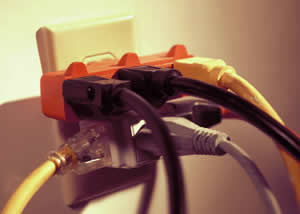- Electrical:

Figure 3 - Incorrect wiring for home office
- Communications:
- Security & Insurance:
Although not always the case, most home offices require electrical services for computers and other office equipment. Many homes do not have the necessary electrical service available in any specific room. You need to live safely and not create a birds nest of cords all plugged into one electrical outlet, as shown in Figure 3.
When you are considering a home office, do a rough calculation of the power required for the office equipment and computers that you may be placing in the room - then double it for the addition of future items.
You should also consider surge protection devices to protect your office equipment and computers. If the loss of electrical service could be critical to your business you may want to consider investing in UPS (Universal Power Supply) systems.
Additional information on surge protection and UPS systems.
If you have reasonably convenient access from the electrical distribution panel to the room you are converting to an office, consideration should be given to adding a couple of dedicated 15 or 20 amp circuits, specifically for computers and office equipment.
Remember that when setting up the office, it is wise to keep desks and tables up against walls so that it is not necessary to run extension cords across floors - a definite hazard.
A home office is not going to be very efficient without communications. If the room does not have outlets for Internet and/or telephone service, the problems can be solved by the use of wireless communications for both services.
However, it should be noted that wireless services do not provide the security that you may need for your business venture. As well, electronic equipment such as photocopiers can have negative effects on wireless communication networks.
If it is possible to provide a hard wired connection for all communication requirements to your home office it is a wise investment.
There are two types of security that you have to consider when you create a home office – external and internal.
In business security usually falls under the heading of risk management. How much damage to your on-going business – your income, could be done by a fire or theft? As an example, if the damage to your income was $100 there is little sense in spending $1,000 to protect it. But, if the damage to your income could be $100,000 is it worth spending $5,000 to protect it? Only you can make the decision on the values associated with risk management.
External Security:
Your livelihood may depend on the information that is contained in your computer and files in your home office.
Do you carry inventory in your home? What would the cost to you be if that inventory was stolen or damaged by fire or water?
If your office is on a ground floor you should consider window treatments that prevent anyone outside your home from being able to see the abundance of office equipment and/or inventory in your home office. Computers, fax machines, printers and copiers are magnets for petty thieves.
You can add a monitored security system to your home. However that may not stop an intruder. You can consider adding better window fasteners and dead-bolts to doors to prevent break-ins. You can go to one more level and install bars on windows and doors.
Internal Security:
Internal security is more difficult to come to grips with than external security.
What could happen to your business if one of your younger children decided to play on Mommy’s or Daddy’s computer because the door to your home office was left open?
A simple exterior passage set on the door with a key, might be all that is needed!
Insurance:
If you are planning a home office you should consider how it may affect your current home’s insurance coverage. Your insurance policy may require that you notify the company that you now have a home office.
If you have visitors coming to your home office you may want to think about the level of your liability insurance.
If you have inventory stored at your home your home owner’s policy will most definitely exclude replacement cost due to any event such as water, fire damage or theft.
